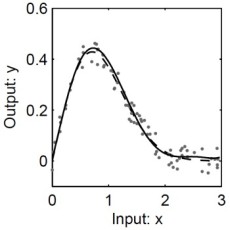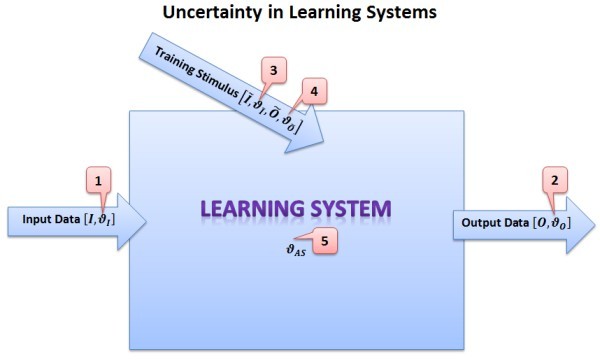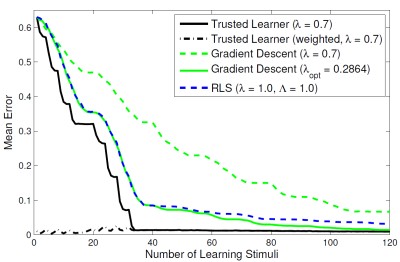Modern technical systems are embedded more and more into complex and non-stationary environments. Their complexity hence increases and to simplify the design process as well as to deal with varying operating conditions or a changing environment, learning systems are employed. But from the systems point of view these variations introduce uncertainties, yet especially in online learning systems safety must be assured always.
 One category of learning systems is the approximation of continuous functions, also known as regression problem. It may be useful for example to generate a model of the system behavior online for predicting its future behavior or for an adaptive and self-tuning controller. Our work focusses on online learning systems. They always adapt to the present circumstances and ensure a low computational and memory demand which is crucial in technical systems.
One category of learning systems is the approximation of continuous functions, also known as regression problem. It may be useful for example to generate a model of the system behavior online for predicting its future behavior or for an adaptive and self-tuning controller. Our work focusses on online learning systems. They always adapt to the present circumstances and ensure a low computational and memory demand which is crucial in technical systems.
The second focus of our research is set on the uncertainties influencing a learning function approximation. Hence our approach is to reflect the status of the learning process regarding its approximation performance. So the basic idea is to model the uncertainty of the learning system, hence its trustworthiness, explicitly and dynamically. This information about the trustworthiness is used in two ways. Namely as an attribute for the output signal giving the trust in learned knowledge and as a feedback within the learning method as well to control and optimize the learning process itself dynamically.
The influence of uncertainties on the learning system can be rughly devided in five categories.

- 1. The given input data for the evaluation of a learning system might be subject to uncertainties.
- 2. The resulting output of the approximation might be uncertain.
- 3. At learning the given input data, hence the point in input space where to learn, might be uncertain.
- 4. The target value to be learned might be uncertain.
- 5. The structure of the approximator reduces the expressiveness and hence introduces uncertainties.
These uncertainties can threaten the safety of the system and have to be dealt with. Consequently the aim of our research is to explicitly deal with these uncertainties within the online learning process to get a robust learning behavior. Furthermore the resulting uncertainty of a given output value is estimated to give meta information to the surrounding system which uses the learning system for a specific task.
Examples of Application:
In 2011 we introduced the Trusted Learner, where we combined our trust management approach with a learning fuzzy system. The algorithm directly asses the trustworthiness of the parameters of the learning system and uses this information, to adjust its learning method. For non-trustes parameters the algorithm extrapolates the knowledge of a learning stimulus, whereas for trusted parameters a learning stimulus has interpolating influence. The image shows three typical cases with untrusted parameters (left), one trusted and one untrusted parameter (center) and trusted parameters (right).

 The resulting algorithm was compared with state of the art online learning algorithms, like the gradient descent or recursive least squares (RLS). The trusted learner outperforms the other algorithms as shown in the figure because it is able to exploit more information, especially in the initial learning phase where the influence of initial values on standard learning methods is big.
The resulting algorithm was compared with state of the art online learning algorithms, like the gradient descent or recursive least squares (RLS). The trusted learner outperforms the other algorithms as shown in the figure because it is able to exploit more information, especially in the initial learning phase where the influence of initial values on standard learning methods is big.
Furthermore, the dash-dotted line shows the approximnation error weighted with the trust signal given by the approximator for its result. This weighted error is always low and shows that incorrect knowledge of the approximator is adequately reflected.